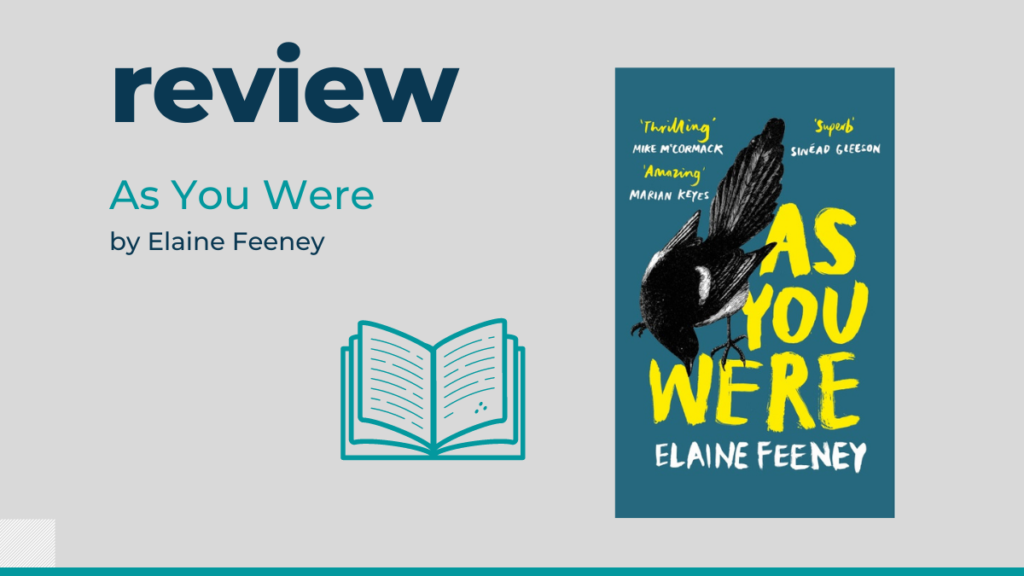
As You Were
by Elaine Feeney | Harvill Secker | 389pp | pb £14.99 | 9781787301634
review by Eoghan Smith
As You Were is the fiction début of Elaine Feeney, the author of three acclaimed collections of poetry. This raw and, at times, blackly comic story centres on Sinéad Hynes, a mother of three, who has been admitted to an ailing hospital in Galway. Sinéad is suffering from cancer, though she has neglected to inform her relentlessly sweary, vapid husband Alex (he is a man who ‘worked in simple’). As her condition deteriorates and her anxiety grows, she passes the time by googling manically or by interacting with the other patients on the ward—a motley, sometimes-amusing and sometimes-tragic collection of individuals, whose own stories serve as an index of Ireland’s recent, disfigured past.
Sinéad’s illness and her failure to disclose it to her family alerts the reader to the thematic core of the novel: the debilitating effects of secrecy, shame and guilt. Not only physically ill, Sinéad is also psychologically troubled by her past. There is the trauma of the stillborn daughter whose death she and Alex don’t speak about. Then there is the memory of her father, a cruel and violent rural patriarch who brutalised her mother and continually demeaned Sinéad as a girl. His hateful voice regularly intrudes into Sinéad’s consciousness, indicating the continuing grip the past maintains on the present. Others in the hospital ward are struggling with their own experiences of secrecy, shame and guilt. There is Hegs, a local Fianna Fáil politician with a history of grubbiness. Another patient, Jane, is a dementia sufferer whose occasional episodes of lucidity reveal a heart-breaking story of impermissible love. In the most significant subplot in the novel, another patient, Margaret Rose, a working-class matriarch, organises through a series of text messages and phone calls her daughter Niquita’s trip to Manchester for an abortion. Through these and other characters, familiar Church and State failures, which destroyed in particular the dignity and lives of women in Ireland in the twentieth century, are represented. The overstretched hospital itself is in need of repair, and the cast of medical staff, with the exception of a likeable Polish orderly and a chirpy Australian nurse, are largely emotionally indifferent to the personal suffering of the patients. And then there is the institution of the family: Feeney’s novel offers a number of different models, each with their own internal systems of policing and consequent emotional and sexual failures.
The novel poses the question of how stories that must be told can be told, and As You Were is formally inventive in its depiction of lives on the verge of falling apart through illness, trauma, miscommunication, or death. The patchwork narrative, told from Sinéad’s perspective, is comprised of devices ranging from text-speak to stream of consciousness. Isolated blocks of text or single sentences replace the traditional paragraph. Irruptions of memory intertwine with lengthy passages of dialogue. There is a bombardment of objects and consumables; Sinéad’s is recognisably a life that has been lived in the relentless cross-flow of global capitalism and popular culture at the end of the last century and the beginning of this one. Out of all this, Feeney marvellously shapes a story that is fragmented and far-reaching and at the same time feels perfectly coherent and intimate. The unique vibrancy of Galway is wonderfully evoked here in sweeping, lyrical passages, and the people of that city are perfectly described as ‘an odd mixture of bog and bohemia’.
As You Were offers a complex picture of Ireland at the end of the 2010s. The novel opens up many questions. How have we as a society spoken about, or failed to speak about historical trauma? How and why have women’s bodies in particular been so cruelly institutionally policed, by the Church, by the State, through the healthcare system, and by society at large? How can we be honest with each other and accept each other’s humanness? Have we replaced one set of failures with another? This is a novel of our time: if there was a feeling during the 2000s that Ireland had begun the giddy process of waking up from the nightmare of history, the 2010s has been a decade of examination of the deep traumas of Ireland’s past. Feeney’s book suggests that not only is the past ever present, but how to talk about things that have been secreted away remains a complicated business. In the novel we learn that Sinéad has always been a voracious reader, much to her callous father’s vituperative distrust. References in the novel to Edna O’Brien and John McGahern suggest a sympathy for twentieth-century Irish novelists who, in O’Brien’s words, worked against official pressures to lay bare ‘the dark underbelly of Irish society’. Decades later, As You Were continues that work.
***
Eoghan Smith is a writer, critic and academic. He is the author of the novel The Failing Heart (Dedalus, 2018) @EoghanSmith5











